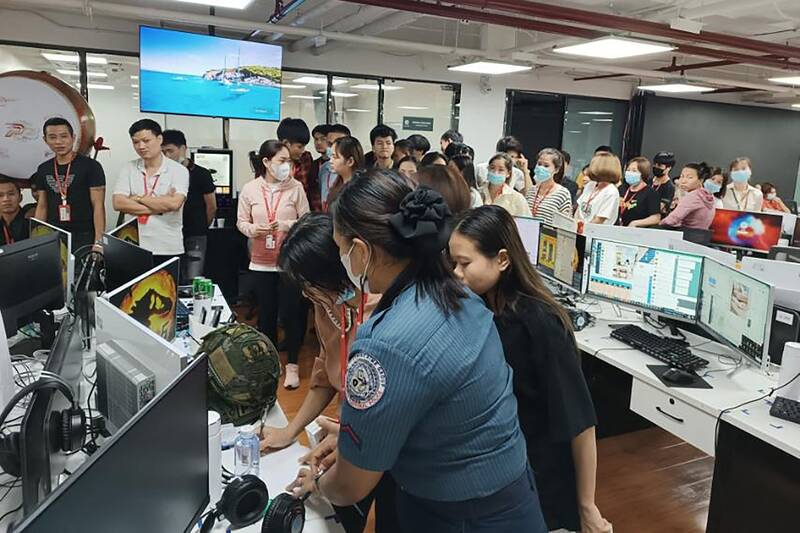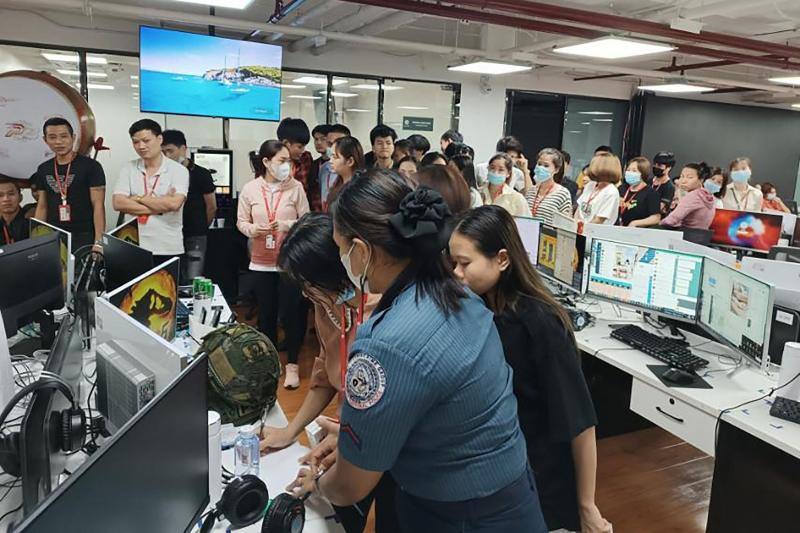Philippine authorities on Saturday said they rescued more than 1,000 people from several Asian nations who were trafficked into the country, held captive and forced into working in fraud operations, while Indonesian officials yesterday said they freed 20 of their nationals who were trafficked to Myanmar as part of an online scam.
Philippine authorities rescued 1,090 people from several Asian nations who were trafficked into the country, held captive and forced to run online scams, an official said.
International alarm has grown in recent months over online scams in the region often staffed by trafficking victims tricked or coerced into promoting bogus cryptocurrency investments.

Photo courtesy of Philippine National Police Anti-Cybercrime Group via AFP
Officers raided a cluster of buildings on Thursday in Mabalacat, about 90km north of Manila, Philippine national police spokeswoman Michelle Sabino said.
Sabino said the victims were forced to target unsuspecting people in the US, Europe and Canada.
Their passports were confiscated and they were made to work up to 18 hours a day, with salary deductions for interacting with colleagues or taking extended breaks.

Photo courtesy of Philippine National Police Anti-Cybercrime Group via AFP
“You’re like a prisoner without a cell. You’re not even allowed to talk to your roommates,” Sabino said. “They’re not allowed to leave outside the bounds of the gate. After 18 hours of work, they’re brought to their dormitory.”
The victims were mostly Chinese nationals, Vietnamese, Filipinos and Indonesians, police said in a separate statement.
Authorities also rescued people from Malaysia, Thailand, Taiwan, Myanmar, Hong Kong and Nepal.
Sabino said the workers were trained to entice strangers into buying cryptocurrency or depositing money into bogus bank accounts after establishing fake romantic relationships.
“They will build up a promise of a good future together. Let’s buy a house, buy a car, let’s invest money or let’s do business together,” she said.
At least 12 suspected ringleaders of the scheme have been arrested and are set to be charged with human trafficking. They include seven Chinese nationals, four Indonesians and a Malaysian, Sabino said.
Sabino also said the police operation was the result of a plea by the Indonesian ambassador in Manila for help locating distressed nationals.
Meanwhile, the Indonesian Ministry of Foreign Affairs said in a statement that its embassy in Yangon, with help from local networks, had released the victims from Myawaddy township and brought them to the Thai border on Saturday.
The Indonesian embassy in Bangkok is working closely with Thai authorities to repatriate the victims, the statement said.
Fraudulent recruiters had offered the Indonesians high-paying jobs in Thailand, but instead trafficked them to Myanmar to perform online scams for cryptocurrency Web sites or apps, Indonesian Ministry of Foreign Affairs official Judha Nugraha said.
The situation drew a national outcry in Indonesia after a video made by one of the victims went viral on social media last month. It showed dozens of grim-faced Indonesian workers in a dormitory room asking their government to help them out of “the war zone” where they often witness violence.
“Please help us back to Indonesia, because our life here is very miserable and threatened,” one person said, describing how they had been transferred from one company to other companies over the past eight months before being stranded in Myawaddy.

OPTIMISTIC: A Philippine Air Force spokeswoman said the military believed the crew were safe and were hopeful that they and the jet would be recovered A Philippine Air Force FA-50 jet and its two-person crew are missing after flying in support of ground forces fighting communist rebels in the southern Mindanao region, a military official said yesterday. Philippine Air Force spokeswoman Colonel Consuelo Castillo said the jet was flying “over land” on the way to its target area when it went missing during a “tactical night operation in support of our ground troops.” While she declined to provide mission specifics, Philippine Army spokesman Colonel Louie Dema-ala confirmed that the missing FA-50 was part of a squadron sent “to provide air support” to troops fighting communist rebels in

ECONOMIC DISTORTION? The US commerce secretary’s remarks echoed Elon Musk’s arguments that spending by the government does not create value for the economy US Secretary of Commerce Howard Lutnick on Sunday said that government spending could be separated from GDP reports, in response to questions about whether the spending cuts pushed by Elon Musk’s Department of Government Efficiency could possibly cause an economic downturn. “You know that governments historically have messed with GDP,” Lutnick said on Fox News Channel’s Sunday Morning Futures. “They count government spending as part of GDP. So I’m going to separate those two and make it transparent.” Doing so could potentially complicate or distort a fundamental measure of the US economy’s health. Government spending is traditionally included in the GDP because

Two daughters of an Argentine mountaineer who died on an icy peak 40 years ago have retrieved his backpack from the spot — finding camera film inside that allowed them a glimpse of some of his final experiences. Guillermo Vieiro was 44 when he died in 1985 — as did his climbing partner — while descending Argentina’s Tupungato lava dome, one of the highest peaks in the Americas. Last year, his backpack was spotted on a slope by mountaineer Gabriela Cavallaro, who examined it and contacted Vieiro’s daughters Guadalupe, 40, and Azul, 44. Last month, the three set out with four other guides

Sri Lanka’s fragile economic recovery could be hampered by threatened trade union strikes over reduced benefits for government employees in this year’s budget, the IMF said yesterday. Sri Lankan President Anura Kumara Dissanayake’s maiden budget raised public sector salaries, but also made deep cuts to longstanding perks in a continuing effort to repair the island nation’s tattered finances. Sri Lanka’s main doctors’ union is considering a strike from today to protest against cuts to their allowances, while teachers are also considering stoppages. IMF senior mission chief for Sri Lanka Peter Breuer said the budget was the “last big push” for the country’s austerity